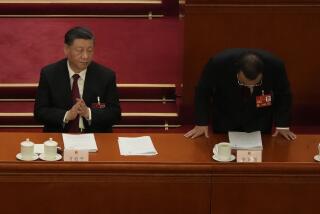Around Hong Kong, It’s Business as Usual Despite News of Deng
- Share via
HONG KONG — In the reddening dawn of the morning after Chinese senior leader Deng Xiaoping’s death, people here maintained their routine, practicing tai chi, driving to work or sweeping the streets as usual. And at noon, while flags were lowered to half-staff, the stock market quietly rose.
Their calm today seemed a subtle tribute to Deng’s wish for freewheeling Hong Kong--that it should not have to be like Communist China, a concept he called “One Country, Two Systems.” Deng conceived this plan to ease the territory’s return to the motherland.
“They may close the shops and bars in China today, but not in Hong Kong,” said Henry Liu, standing outside a disco at 4 a.m., an hour after the official announcement of Deng’s death. “He’s been dying for a long time, and he doesn’t matter much to Hong Kong anymore.”
Hong Kong, though, has been skittish in the period leading up to July 1, when Britain is to return the territory to China.
This has been the typical nervousness that is partner to the unknown. But the lack of panic here seems to show faith that Deng’s progressive policies will be upheld.
“I think that the basic policies toward Hong Kong will not change,” said Andrew To, a member of the Hong Kong Alliance, a political party that aids dissidents fleeing the mainland and thus has much to fear if the leadership in Beijing decides to take a harder line on Hong Kong. “The expected power struggle in Beijing may cause instability in China, but Hong Kong is one thing they all agree on.”
To was in rare agreement with David Chu. By 7 a.m., the time most residents were just awakening to the news, Chu had already written a eulogy for Deng.
“There will be no impact on Hong Kong,” Chu said, speculating about the effects of Deng’s death. “The leadership transition has taken place two or three years ago, and the Hong Kong policy is endorsed by all the leadership in Beijing. It’s not personality dependent.”
Beijing gave a boost to Hong Kong confidence by naming Tung Chee-hwa, Hong Kong’s leader-in-waiting, to the funeral committee--a signal of the territory’s heightened importance to Beijing.
Tung was already in Beijing consulting with the central government about his choices for his Hong Kong Cabinet. Early editions of newspapers here showed a picture of a smiling Tung clasping hands with Chinese Premier Li Peng, taken just hours before Deng died.
Meantime, at newsstands in Hong Kong today, workers rushed to replace sold-out special editions of newspapers featuring news of Deng; those souvenirs had already been snatched up by early risers.
The Chinese-language Tin Tin Daily News editorial eulogized: “All Chinese people around the world will weep at the passing of a man whose accomplishments will never be diminished. It is a shame he won’t be here to witness the hand-over.”
The Hong Kong Economic Times hinted at a reckoning to come. “The Tiananmen crackdown is still regarded as a wrong that should be rectified,” it said, in a reference to the bloody 1989 suppression of pro-democracy protests in Beijing, probably ordered by Deng.
The 1989 crackdown is one of the main causes of anxiety about Hong Kong’s future under China. Deng may take some of those fears to the grave with him, and what he leaves behind--a substantial legacy of economic and political reform--is even more reassuring, say academics.
“Many people forget that it was Deng who introduced local elections to China in 1982, and they have taken root,” said Michael Degolyer, a professor at Hong Kong Baptist University. “He laid the foundation for modernization not just economically but on a political level as well.”
The stock market here is a closely watched measure of people’s short-term sentiments. In the past, rumors of Deng’s demise have caused Hong Kong trading to roller-coaster, and well-founded whispers of his illness caused a 500-point drop this week. But at noon today, the market was up 176 points, to 13,283.
Analysts say Deng’s passing has already been largely discounted, both emotionally and economically.
“It has to be one of the most anticipated events in modern history,” said Richard Margolis, first vice president at Merrill Lynch. “But it will be regarded in Hong Kong as somehow unseemly if the market went up on the day of Deng’s death.”
More to Read
Sign up for Essential California
The most important California stories and recommendations in your inbox every morning.
You may occasionally receive promotional content from the Los Angeles Times.













